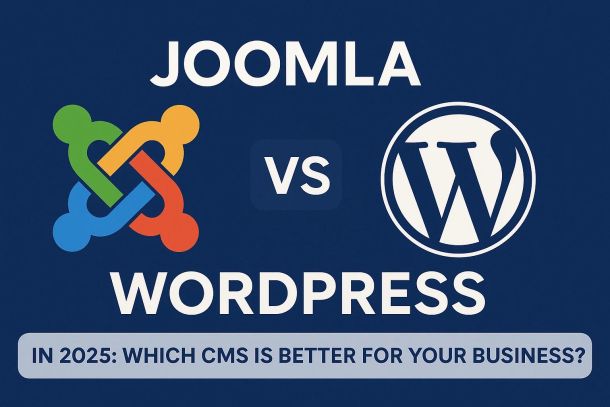Joomla vs WordPress in 2025: Which CMS is Better for Your Business?
With Joomla and WordPress To 2025 Choosing the best content management system (CMS) is the first step toward building a successful website. In 2025, the two leading free and open-source CMS platforms continue to be Joomla and WordPress. While both enable businesses to develop dynamic and feature-rich websites, the experience is quite different in terms of ease of use, scalability, flexibility, and performance. This detailed article will help you compare Joomla and WordPress in critical categories to understand the best option for your business objectives.
As we move further into 2025, choosing the best content management system (CMS) is one of the most important choices for any business that wishes to exist online. Two of the most popular and trusted platforms continue to dominate the industry: Joomla and WordPress. Both are open-source platforms that offer powerful tools, but they cater to different user needs and technical expectations. This extensive comparison looks in-depth at the significant differences between Joomla and WordPress—including usability, flexibility, security, SEO, scalability, and overall business value—to help you choose what CMS is the best fit for your project in 2025 and beyond.
Snapshot: Joomla and WordPress in 2025
WordPress powers over 40% of all websites on the Internet. It is the first CMS that comes to mind. It is admired for its incredibly user-friendly interface, its massive ecosystem of themes and plugins, and a worldwide community of users. Joomla, while not as widely adopted, continues to be a strong choice for sophisticated websites that need advanced user access control, multilingual sites, or custom logic. Joomla’s structure is more developer-focused, providing powerful features out of the box without third-party plugins required.
Ease of Use
Regarding ease of use, WordPress is the clear winner for beginners. Its admin panel is intuitive, minimalistic, and built for users without coding experience. With just a few clicks, you can install themes, add plugins, and begin publishing content. Joomla, on the other hand, has a more complex interface. Its learning curve is steep, but the control it offers is unmatched. It provides more built-in configuration options, making it ideal for developers or site owners who want to control every aspect from the beginning.
Customization and Flexibility
Joomla is superior in terms of flexibility. It has powerful module and component systems, advanced user access control (ACL), and support for multiple templates within the same website. If you’re building a site with custom content types, complex navigation, or role-based permissions, Joomla offers a cleaner, more structured approach. WordPress can also be extended with thousands of plugins and custom post types, but it increasingly relies on third-party solutions for advanced features. That makes it more susceptible to plugin conflicts, performance issues, and security holes.
Performance and Speed
Page speed and performance are crucial in 2025 for SEO and user experience. Joomla websites tend to perform better out of the box, especially with optimized templates and fewer extensions. Joomla’s native caching and compression settings can be adjusted from the admin panel. WordPress performance largely depends on how the site is built. Using too many plugins or bad themes can slow it down significantly. But with the right setup—lightweight themes, proper caching (e.g., WP Rocket), and CDN integration—WordPress can be blazing fast.
Security
Security is one of Joomla’s strong points. It has built-in features like two-factor authentication, extensive user permissions, and CSRF protection. Joomla’s development team is proactive in patching vulnerabilities. It has a good official security checklist. WordPress, due to its popularity, is a bigger target for hackers. While the core is secure, the real threat is outdated or poorly managed plugins and themes. WordPress requires updating, managing admin passwords, and usually using extra security plugins like Wordfence or Sucuri.
Search Engine Optimization (SEO)
SEO is more crucial than ever in 2025, and both platforms support excellent optimization. WordPress comes out ahead regarding user-friendliness, thanks to plugins like Yoast SEO and Rank Math that walk users through best practices, from keyword usage to meta tags and sitemaps. On the other hand, Joomla offers more manual control of SEO settings and clean, customizable URLs without the need for extra plugins. You can handle title tags, meta descriptions, canonical tags, breadcrumbs, and even use structured data (Schema) with built-in or light extensions.
For technical SEO, Joomla provides more options at the core level, making it better for developers looking to fine-tune every detail. WordPress depends on third-party plugins, which can add bloat or conflict with other tools if not carefully chosen.
Multilingual Capabilities
If your business serves many regions, Joomla has built-in multilingual support without using third-party options. Language content associations, translation overrides, and locale switching are all a part of Joomla core. In contrast, WordPress requires plugins like WPML or Polylang to add multilingual functionality. While these plugins are powerful, they can complicate your site’s performance, backup routine, and update process.
Community and Support
WordPress has a global community of huge proportions, with thousands of tutorials, active forums, developer blogs, and dedicated support teams. Whether you’re a beginner or an advanced user, you’ll find the answer to most of your questions immediately. Joomla’s community is smaller but has specialization. Joomla’s official forums, documentation, and developer networks are filled with experienced users eager to help—especially on the more technical issues. You may find fewer resources overall, but the quality is usually higher for complicated use cases.
Scalability and Long-Term Value
As your business grows, your website should grow with it. Joomla is a better fit for complex, enterprise-level websites. Its native support for custom development, data structuring, and user management makes it a reliable base for large, multi-departmental sites. WordPress is great for fast-moving businesses, marketing campaigns, personal brands, and smaller eCommerce operations. It can be scaled up with the right hosting and optimization, but eventually, managing a large WordPress site can become time-consuming without a dedicated development team.
Cost and Licensing
WordPress and Joomla have the same price: free. Both are released under the GNU General Public License. However, the price of maintaining a site depends on how you want to use it. On WordPress, you’ll probably spend more on premium plugins, themes, and performance/security services. Joomla has more advanced functionality out of the box, which can reduce or eliminate the need for paid extensions—especially at a professional level.
When Should You Choose Joomla?
Joomla is the right choice if:
You’re creating a complicated website with custom structures or user roles.
Multilingual support is necessary from day one.
You want native security, performance, and SEO features without depending on third parties.
You (or your team) have experience with development or would rather have full control of the system.
When Should You Choose WordPress?
WordPress is a better choice if you:
Need a simple website up and running quickly.
Want a low learning curve and friendly content editing.
Are building a blog, portfolio, or small eCommerce store.
Depend on a wide ecosystem of plugins and templates to speed up development.
Conclusion: Joomla or WordPress for Your Business in 2025?
In the end, Joomla and WordPress are both powerful CMS platforms, but they have different goals. WordPress is unbeatable regarding fast deployment and ease of use, especially on small to medium websites. On the other hand, Joomla offers enterprise-level control and flexibility, making it a perfect fit for technically demanding projects and long-term scaling.
At Renexen.com, we are focused on custom Joomla development. We help businesses create secure, fast, and SEO-optimized sites fit for the future. If you want expert advice or a custom Joomla solution—talk to us today. Choose wisely, and your content management system will power your business for years to come.
M. Phillips, K. Phillips, and P. McDaniel, *Using Joomla 4 (4th Edition)*, *Independence (Independence, 2024)*. WooCommerce, *10 Statistics That Reveal the Importance of Having a Great Website for Your Business*, 2025. A. Williams and R. Williams, *Comparing Joomla and WordPress (4th Edition)*, *Cambridge (Cambridge, 2024)*.


